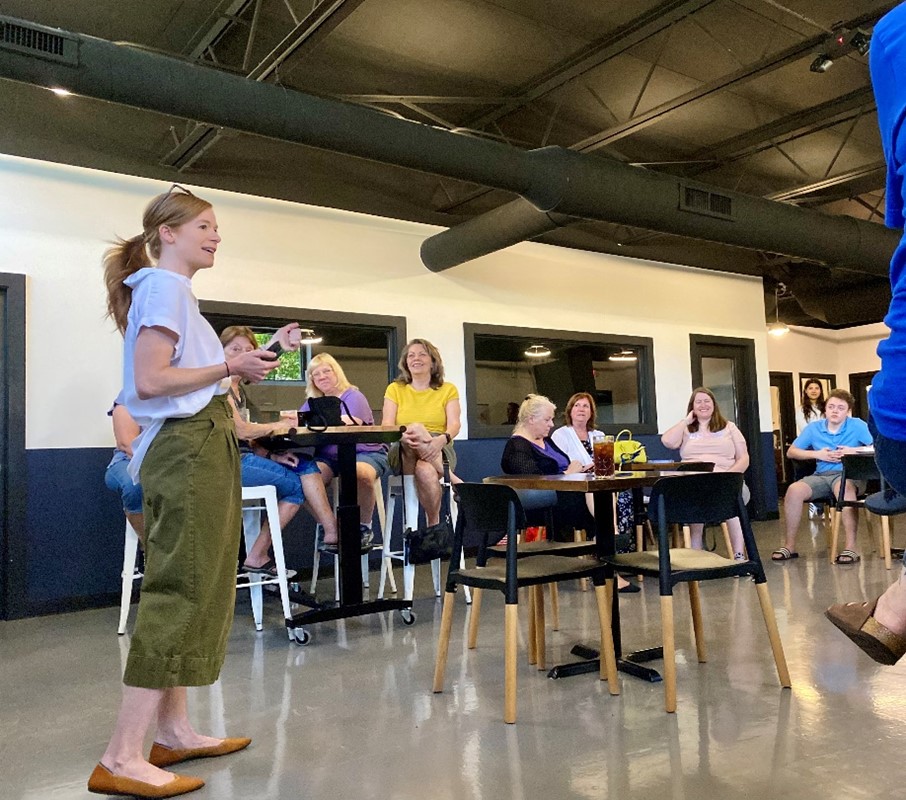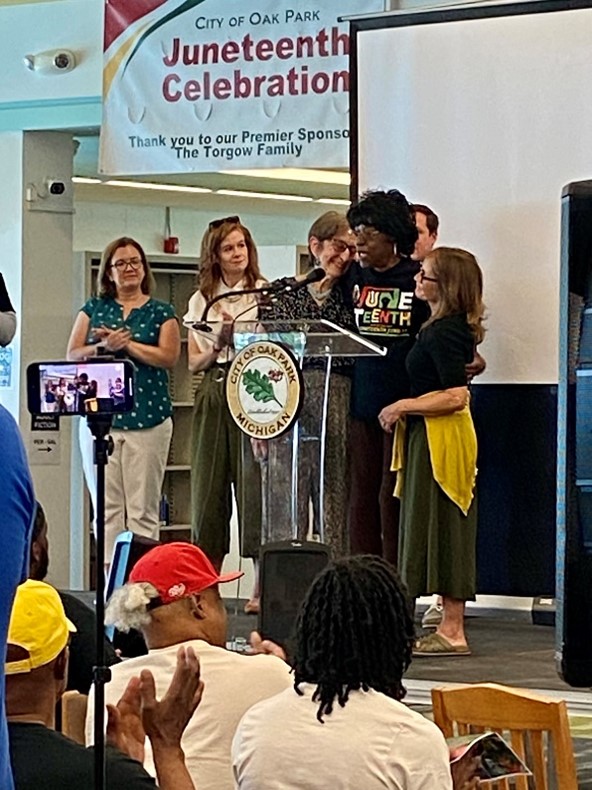
Last Thursday marked the official start to summer — and with that came extreme temperatures that have fortunately tapered off.
After long hours this week, we finalized negotiations with the House of Representatives before sending the budget to the governor’s desk for signing. Stay tuned to hear more about the transformative investments we are delivering for the good of our state.
As always, if you or someone you know would like to provide feedback about what’s happening in Lansing or needs assistance, feel free to contact my office. You can contact me by sending an email to SenMMcMorrow@senate.michigan.gov or calling (517) 373-2523.
Sincerely,

Mallory McMorrow
State Senator
District 8
Featured in This Newsletter
- Legislative Updates
- News You Can Use
- In The Community
- Good News from the District
Legislative Updates
Recognizing the Second Anniversary of Roe v. Wade’s Overturning

On June 24, 2022, the U.S. Supreme Court overturned the landmark Roe v. Wade decision in the Dobbs v. Jackson Women’s Health Organization case, eliminating the constitutional right to abortion and returning the right to abortion and reproductive freedom to the hands of each state. The Supreme Court stripped millions of Americans of their right to bodily autonomy, abandoning nearly half a century of precedent and paving the way for states to outright ban abortion.
Following this unconscionable Supreme Court decision, many states took immediate action to outlaw abortion, forcing their residents to carry pregnancies against their will or travel out-of-state to receive necessary reproductive healthcare services. But here in Michigan, we quickly got to work to safeguard your basic human right to reproductive freedom by:
- Passing Senate Bill 2 (Sen. Erika Geiss), which repealed an antiquated 1931 law that criminalized abortion care in the state of Michigan.
- Championing Senate Bill 147 (Sen. Erika Geiss), which amended the Elliott-Larsen Civil Rights Act (ELCRA) to prohibit employers from firing, demoting, or discriminating against employees for receiving abortion services.
- Enacting the Reproductive Health Act (Sens. Sarah Anthony, Erika Geiss, and Mary Cavanagh), which repealed medically unnecessary regulations and TRAP (Targeted Regulation of Abortion Providers) laws that were specifically crafted to close and restrict abortion providers; ensures students at public universities have access to accurate information about all their reproductive health options; repealed the law that forced patients to buy a separate insurance rider for abortion; and much more.
- Eliminating unnecessary hurdles to surrogacy and assisted reproductive technology, including IVF, by passing House Bills 5207–5215, also known as the Michigan Family Protection Act.
I was a cosponsor of SB 2, and together, this critical legislation reaffirms every Michigander’s right to bodily autonomy, self-determination, and health privacy. On the second anniversary of the Dobbs decision, Michigan Senate Democrats remain dedicated to continuing our efforts to protect basic human rights and eliminate barriers to essential reproductive health care here in Michigan.
Michigan State Budget

Crafting a state budget is a collaborative effort involving negotiations between both legislative branches and the governor, resulting in a new state budget being signed into law each year to distribute funding to residents, schools, communities, businesses, local governments, and more.
After a 19-hour session, the Legislature passed a balanced Fiscal Year 2025 State Budget early Thursday morning. We worked hard to ensure the budget was finalized before July 1 because although the state’s fiscal year begins October 1, the budget years for schools, local governments, and colleges and universities start next week. The budget is now on its way to Governor Gretchen Whitmer’s desk.
Read more about the budget here.
Legislation Introduced to Enhance Protections for Vulnerable Adults
Elderly individuals and vulnerable adults are at high risk of being subject to abuse and exploitation at the hands of family members, friends, or other close associates. To keep Michiganders safe from harm, Sens. Veronica Klinefelt (D-Eastpointe), Sarah Anthony (D-Lansing), Kevin Hertel (D-St. Clair Shores), and Jeff Irwin (D-Ann Arbor) introduced Senate Bills 922–925 last week to better protect those who are unable to protect themselves because of advanced age or a mental or physical impairment. This comprehensive legislative package would enhance protections for vulnerable adults by strengthening penalties for abuse and financial exploitation offenses and developing programs to bolster prevention efforts.
This package has been referred to the committee on Civil Rights, Judiciary, and Public Safety.
Senate Unanimously Passes “Melody’s Law” to Close Loophole in Michigan’s Criminal Code
The Michigan Senate recently voted to close a glaring loophole in the state’s criminal code. The Senate acted in unanimous fashion to pass Senate Bills 841–843, sponsored by Sen. Veronica Klinefelt (D-Eastpointe). Known collectively as “Melody’s Law,” these bills explicitly outlaw necrophilia. The legislation stems from the despicable 2021 murder of Michigan resident Melody Rohrer, who was also the victim of a heinous act of sexual assault after her murder.
The legislation ensures that those convicted of this horrific act are held accountable by amending the Michigan Penal Code, PA 328 of 1931, to make the act of necrophilia punishable by up to 15 years in prison and require perpetrators to register in the Michigan Public Sex Offender Registry (PSOR).
Michigan Senate Passes Bill to Enhance Safety for Vulnerable Roadway Users
Led by Sen. Sean McCann (D-Kalamazoo), Michigan Senate Democrats passed Senate Bills 617 and 618, which would amend the Michigan Vehicle Code to prescribe a felony penalty for committing a moving violation against a vulnerable roadway user and as a result causes injury or death.
Senate Bill 618, sponsored by Sen. Veronica Klinefelt (D-Eastpointe), defines vulnerable roadway users as a pedestrian, individual using a bicycle, roller skates, inline skates, a nonmotorized scooter or skateboard, a wheelchair, an individual riding equine, and a U.S. Postal Service employee or contractor, among others.
Bills to Establish Tenant Right to Organize and Right to Repair
Sen. Sarah Anthony (D-Lansing) introduced, and I cosponsored, Senate Bills 900–903, known as the Tenant Empowerment Package. These bills would protect tenants’ rights and tighten up Michigan law to ensure all renters have the tools they need to fight for those rights. The bills enshrine the right to repair into law to guarantee that landlords provide safe housing and make timely repairs. If landlords fail to initiate repairs promptly, tenants would be allowed to deduct repair costs from their rent. The bills also ensure transparency and fairness in lease agreements by requiring adequate notice for rent increases and preventing landlords from using lease language to eliminate tenants’ rights to repair or their right to organize.
More than a quarter of Michiganders are renters but lack basic legal protections to ensure safe and affordable living conditions. Sen. Anthony believes that every Michigander deserves the right to a safe and dignified living space they can call home. These bills are the first steps Sen. Anthony, and her Democratic colleagues, are taking to address these issues and enshrine the rights of renters and tenants in Michigan’s state law.
Senate Bills 900-903 have been referred to the Senate Committee on Housing and Human Services for further consideration.
Woodward Noise
Our office gets many calls and emails regarding excessive noise on Woodward Avenue. I love cars, and I used to be a car designer, but too often, the duration and high level of noise disrupts those in our community.
I worked collaboratively with Rep. Natalie Price on a bill that is moving forward in the House and recently passed out of Committee.
House Bill 5696 increases fines and penalties not only for those who alter a vehicle’s exhaust system, but also drivers of those vehicles. The legislation ensures police officers have the authority to stop vehicles for excessive noise and will allow law enforcement to impound or tow vehicles of repeat offenders.
The bill provides grace for first-time offenders, vehicles experiencing disrepair, and those who can demonstrate compliance with the Motor Vehicle Act before their ticketed court date.
We are waiting for House Bill 5696 to pass the House.
News You Can Use
Celebrating Juneteenth

Observed on June 19th every year, Juneteenth commemorates the day that the last people who were enslaved in the U.S. learned of their freedom — June 19, 1865, over two years after President Abraham Lincoln presented the Emancipation Proclamation.
The significance of Juneteenth extends beyond its historical roots. It symbolizes triumph over the injustices of slavery and stands as a testament to the progress made and the work still needed to achieve true freedom and equality for all.
Check out our recent story, Celebrating Juneteenth & Black Excellence in the Michigan Legislature, to learn all the ways the Senate’s three Michigan Legislative Black Caucus members are making waves at the Capitol and for the people of Michigan.
Creating a Welcoming, Inclusive State for All During Pride Month

I am committed to cultivating inclusion and belonging in Michigan — not only during the month of June, but every day year-round. I worked to expand the Elliott-Larsen Civil Rights Act (ELCRA), reaffirming and expanding legal protections for the LGBTQ+ community. This effort has been 50 years in the making and protects our LGBTQ+ family, friends, coworkers, and neighbors against discrimination in employment, public accommodations, and public services. It also provides protection in educational facilities, housing, and real estate.
In addition to passing a resolution recognizing June as Pride Month, the Michigan Senate passed bills — including Senate Bills 348 and 349 — to ban the harmful practice of conversion therapy by mental health professionals seeking to change the gender identity or sexual orientation of minors.
These legislative efforts are a big step forward for Michigan, but certainly not the last. Our caucus remains committed to putting forth legislation that will further advance our shared mission of equity and inclusion. Learn more about the history of the LGBTQ+ community in Michigan and how protections we have put in place at the Capitol have led Michigan to being ranked one of the most welcoming states for the LGBTQ+ community in the U.S.
June is Gun Violence Awareness Month

Recently, three mass shootings occurred in different locations across Southeast Michigan, including at Brooklands Plaza Splash Pad in my former district of Rochester Hills.
To draw attention to the issue of gun violence and advocate for life-saving policies, the Michigan Senate passed a resolution recognizing June as Gun Violence Awareness Month. Gun violence is a public health crisis affecting communities across our state. Since 2012, we’ve seen the rate of gun deaths in Michigan increase by 25%, and firearms are now the leading cause of death for children and teens.
My Senate colleagues and I delivered a slate of gun violence prevention legislation that Michigan residents have waited years for. This legislation closed dangerous loopholes to strengthen background checks, requires the secure storage of firearms, disarms individuals convicted of domestic violence, and my Extreme Risk Protection Order (ERPO) legislation allows for the temporary removal of firearms from people who pose a significant risk to themselves or others.
But laws are only as effective as people being aware of them and knowing how to use them. What we often hear from law enforcement is that there were “red flags,” but they weren’t communicated. ERPO can be that tool to remove firearms from someone in the midst of a crisis. I understand people may not want to put their loved one in a situation of “reporting them,” but it’s important to stress ERPO acknowledges that the individual has done nothing wrong but that the presence of a firearm, given a mental health crisis, can be deadly. It’s a lifesaving tool, not a criminal one.
Notably, researchers from the University of Michigan emphasized that much more is needed to address mental health, that ERPO can be a tool to buy time and reduce the risk, but that we also must do more to pair people in crisis with the mental health care they need.
If you are ever in immediate danger, call 911. If you or a loved one are experiencing a mental health crisis, you can call OR TEXT 988.
MPSC Seeks Input on Proposals for Penalties, Incentives Aimed at Reducing Frequency and Duration of Power Outages
The Michigan Public Service Commission (MPSC) announced it is seeking further input on proposals that would establish financial penalties for utilities that don’t meet thresholds for getting the power back on and incentives for reduced outages and faster restoration of service (Case No U-21400). The Commission’s meeting took place at the LV Eberhard Center in downtown Grand Rapids as part of the MPSC’s commitment to increasing accessibility and community engagement on energy and telecommunications matters.
As part of the Commission’s ongoing work to improve the reliability of Michigan’s power grid, the MPSC in 2023 launched a Financial Incentives and Disincentives workgroup, part of the Commission’s MI Power Grid effort, to develop reliability and safety metrics, financial incentives, and penalties for utilities to improve their performance in keeping the power on and reducing the number and duration of outages. The goal of the penalties and incentives is to establish new baselines for performance, financial consequences for not meeting standards, and incentives for exceeding requirements.
After taking input over several months on an initial proposal, MPSC Staff on May 3, 2024, filed a revised straw proposal with recommendations outlining metrics to measure length of outages in various weather conditions and restoration times, the number of customers experiencing four or more outages per year, and data on the worst-performing circuits.
The MPSC seeks comments from interested parties on the straw proposal, which would:
- Establish penalties if a utility’s 3-year system average interruption duration index, or SAIDI (excluding major event days) increases by 5% or more, and an incentive if this measure improves by 10% or more. SAIDI measures the average duration of outages.
- Establish similar penalties and incentives around SAIDI metrics including all weather events. Utilities would be assessed penalties for not meeting 5-year performance goals and incentives for exceeding them by 10% or more. This includes measuring the average duration of outages after major storms.
- Assess a penalty for utilities that do not restore service to 90% of customers within 48 hours of a catastrophic storm (defined as a storm that results in 10% or more of customers losing power), as now required by the MPSC’s Service Quality and Reliability Standards, and incentives if a utility restores more than 90% within 48 hours.
- Assess a penalty if a utility doesn’t restore service to 95% of customers within 72 hours of a catastrophic storm, as well as an incentive for besting 95%.
- Assess a penalty if a utility doesn’t restore service to 90% of customers within 24 hours after gray-sky weather that results in between 1% and 10% of customers losing power.
- Establish a penalty if 6% or more of a utility’s customers experience four or more outages per year, and an incentive if fewer than 6% of customers meet that threshold.
- Assess a penalty if one of a utility’s top 10 worst-performing circuits repeats in the list of worst circuits within 5 years.
In addition, the Commission directed MPSC Staff to hold an engagement session to inform the development of additional metrics relating to the performance of the distribution system by Aug. 7, 2024; details about attending the session will be posted in the case docket. In addition, interested parties are encouraged to file comments on the revised straw proposal by 5 p.m. July 12, 2024, with replies due by 5 p.m. Aug. 23, 2024. Comments may be filed electronically in the case docket or sent by email to mpscedockets@michigan.gov or by mail to Executive Secretary, Michigan Public Service Commission, 7109 W. Saginaw Highway, Lansing, MI 48917. Comments should reference Case No. U-21400.
Read more here.
In the Community


I had an in-person coffee hour at the Ferndale Dessert Oasis Coffee Roasters. I was happy to give an update from Lansing and have thoughtful discussions.
A couple of areas that were asked about were:
- Water Affordability — I co-sponsored Senate Bill 25, which would create a new Human Right to Water Act, ensuring that every individual has the right to clean, accessible, affordable water. Additionally, SBs 549–554, aim to create a Low-Income Water Residential Affordability Program.
- Whether the Big 3 automakers oppose transit — Many support transit funding as it brings in talent to the area. As Amazon’s HQ2 demonstrated, young, talented people demand transit and so do the companies that compete to hire them.
Thank you to everyone who attended!

Together with Governor Gretchen Whitmer as well as federal, city, and state leaders, we broke ground on the Doctor Violet T. Lewis Village site in Detroit. The complex is a redevelopment of the former Lewis College of Business, which Dr. Lewis founded, and was Michigan’s first and only historically Black college. The project will offer over 100 affordable senior living apartments and will be located next to the Northwest Activities Center.


This year was not the first observance of Juneteenth in Michigan, but it was the first year it was an official state holiday! A wonderful crowd came together in Oak Park to reflect on and celebrate this day of freedom. I will always strive for an inclusive future for everyone.

I look forward to walking in the Clawson 4th of July parade this year! It is so much fun, and I hope to see many of you there!
Good News from the District

Photo Credit: Royal Oak Review
Zygmunt Koniecki started working as groundskeeper at the Oakview Cemetery in Royal Oak in 1967 when he was 17 years old. He retired on June 10th after 57 years! He says he is grateful to have worked with families who have loved ones there. Oakview is a very peaceful environment, and over the years, he has also made friends with many who run or walk along the grounds.
Thank you for all you have done, Ziggy, and happy retirement!

The Oak Park High School Girls Track & Field team are National Champions! They won the Sprint Medley at the New Balance National competition and broke their own previous state record! Amazing work, Carrie VanNoy, Morgan Roundtree, Nevaeh Burns, and Kylee King. Congratulations to these athletes and coaches at Oak Park High School!
